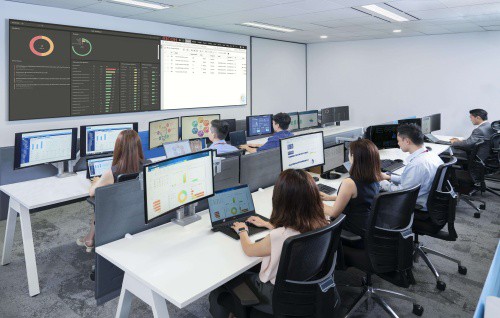In response to working in the "new normal" post-pandemic world, RICOH Hong Kong has established its Network Operations Center in mid-June this year, which aims to build and operate a secure cloud computing, monitoring and control centre for a smart workplace.
With the spread of "Work From Home culture", cloud computing, IoT devices and distributed ICT applications technology is now highly relevant across multiple types of environments.
"Remote working, automation of operational process, video conferencing and the like have become the new normal whilst we work under the constant threat of the pandemic. With the increasing popularity IoT applications, all of the changes show that the market for smart offices is continuing to expand,” said Aaron Yim, managing director of RICOH Hong Kong.
“As the companies' business operating partner, RICOH Hong Kong launched a new Network Operations Center to break the old tradition with innovative office concepts and provide customers with integrated support. And to meet the needs of enterprises for improving efficiency, reducing costs, optimizing customer experience and rapid business changes,” he added.
Furthermore, as cyberattacks have become more sophisticated, the company has geared its new facility as one-stop-shop for advanced cybersecurity, offering Security Workshops, Design & Construction Validation, and Assessment & Analysis of Current Threats & Vulnerabilities.
By making this available to enterprise customers, security standards can be continuously upheld and updated, and they will be provided with full support in the form of optimised security countermeasures in the face of ever-evolving cyber-attacks.
According to Yim, enterprises can now safely optimise their business remote deployments and business continuity plans through the use of cloud network integration which RICOH Hong Kong is innovating sympathetic solutions built around the "3 Smarts"; Smart Workplace, Smart Process and Smart Technology.
Shift towards the “IoT SMART Workplace”
Faced with the New Normal, many companies are reconsidering how they invest in office layouts and resulting access to technological devices, according to Yim.
“We recognises the necessity of having a more flexible workplace, including an effective space utilisation plan, technological support and functionality in use,” he said. “First and foremost, this helps companies address the complicated issue of reopening offices. Safeguarding workplace hygiene as well as the health and wellness of employees and visitors are the top concerns of businesses in the post-pandemic age. For example, facility management teams are seeking alternative ways of organising and running operations to keep them going.”
They must also consider how maintaining physical distancing can be prioritised when creating functional workspaces, he added.
“While helping to keep operations manageable, introducing more Smart devices improves workflows, such as with RICOH's cloud-based Interactive Collaboration Board and integrated tasks such as video conferencing, document printing, etc,” Yim said.
“With IoT technology in place, Smart sensors facilitate workplace management, including lighting system, temperature and air quality control. Sensors are also able to identify health condition indicators of staff members, and data collected from the sensors can be sent to a central database or used to issue priority alerts,” he said.
The company pointed out that information from the sensors can then be used for further analysis, appropriate device control, or to drive business organisational planning and strategies.
The application of these smart technologies not only enhances energy efficiency but also creates a secure digital workplace in which employees can thrive, through supportive, appropriate and intelligent workspace design powered by RICOH Hong Kong.



